Finding the Right Path in Funeral Service Education
Searching for a mortuary science program near me can feel overwhelming, but I'm here to help you steer this unique educational journey. Here's what you need to know at a glance:
| Key Information | Details |
|---|---|
| Number of Accredited Programs | 58 programs across the US |
| Typical Degree Options | Associate in Applied Science (most common), Bachelor's degree, Certificate (60+ credits) |
| Program Length | 2-3 years for Associate's degree (66 credit hours on average) |
| Job Growth | 9% projected growth (2021-2031), adding about 7,900 new jobs annually |
| Licensing Requirements | National Board Exam + state-specific requirements |
| Key Accreditation | American Board of Funeral Service Education (ABFSE) |
Finding the right educational fit is about more than just location. It's about finding a program that aligns with your personal values and professional aspirations in the funeral service field. This unique profession blends scientific precision with heartfelt compassion – requiring both technical expertise and genuine people skills.
I've seen how the journey from classroom to funeral home varies for each student. Some thrive in hands-on environments with lots of practical experience, while others benefit from programs with strong theoretical foundations. What matters most is finding the program that matches your learning style and career goals.
As someone from American Mortuary Coolers who works with funeral homes and educational institutions nationwide, I've gained valuable insights into what makes graduates successful. Our partnerships with mortuary science programs have shown us the importance of quality education in preparing compassionate, skilled funeral service professionals.
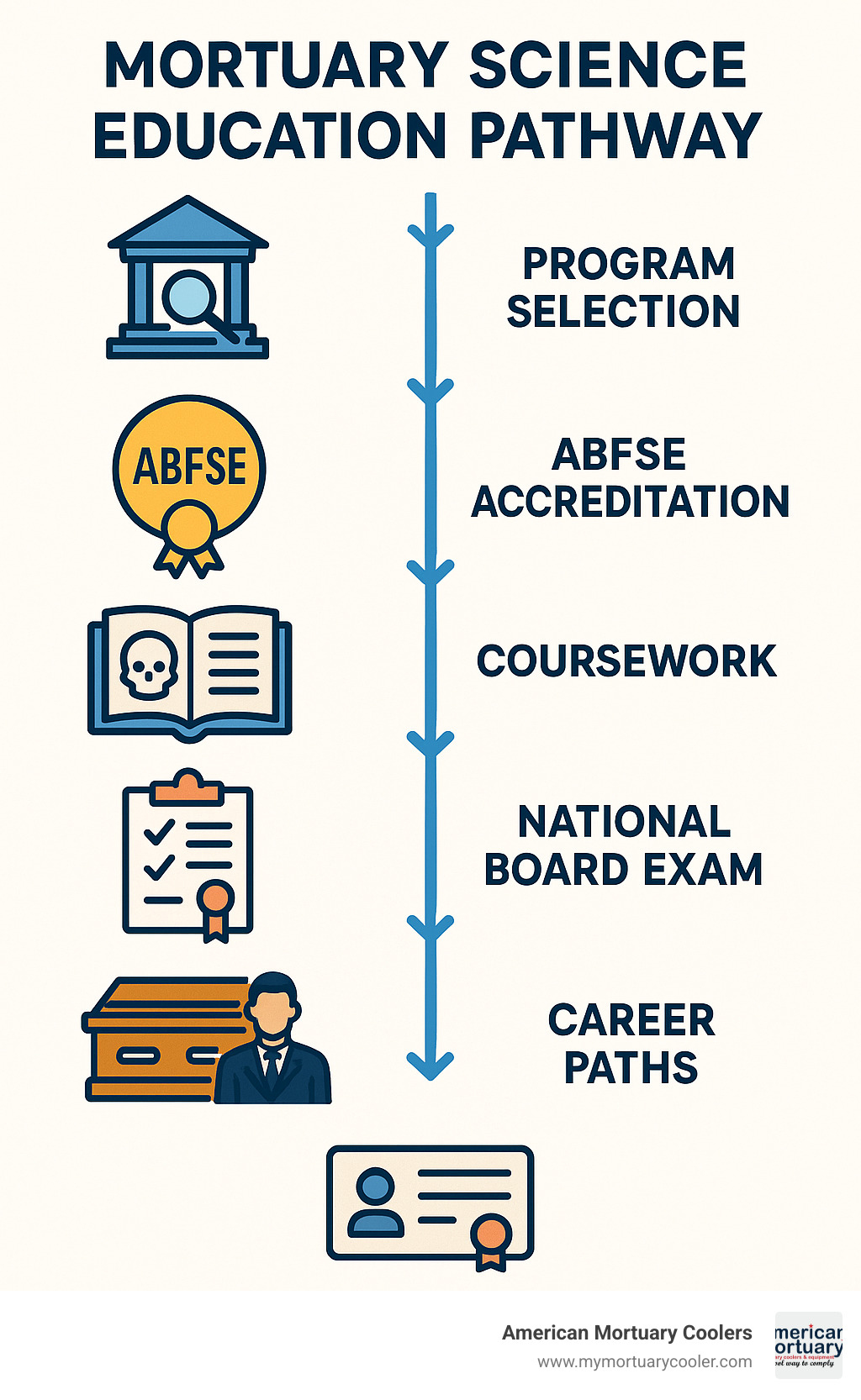
Similar topics to mortuary science program near me:
Why This Guide Matters
Finding a mortuary science program near me goes beyond simple geography – it's about finding an educational home that will launch your funeral service career successfully. With programs scattered from coast to coast, from community colleges to specialized institutes, making the right choice requires careful consideration.
The factors that truly matter include program quality, proper accreditation, curriculum depth, hands-on training opportunities, and overall cost. Whether you're in our home state of Tennessee or across the country in California, understanding these elements will help you make an informed decision about your professional future.
I love what the Dalai Lama XIV once said – a quote often shared in mortuary science classrooms: "Whether one believes in a religion or not, and whether one believes in rebirth or not, there isn't anyone who doesn't appreciate kindness & compassion." This beautifully captures what makes an excellent mortuary science program: technical expertise paired with genuine compassion for families during their most difficult moments.
This guide will walk you through five practical ways to evaluate and choose the right program for your unique circumstances, helping you start on this meaningful career path with confidence and clarity.
Way 1: Clarify Career Goals & Licensing Rules First
Before typing mortuary science program near me into your search bar, take a moment to understand what career path you're actually pursuing. Funeral service is regulated differently across the country, with each state board setting its own unique requirements for licensure.
Think about what aspect of funeral service appeals to you most. Some states maintain separate licenses for funeral directors and embalmers, while others combine them. In some regions, you'll need a bachelor's degree, but in others, an associate degree from an accredited program is perfectly acceptable.
"My educational and professional journey began at HVCC. The lessons I learned provided an excellent foundation for my career choices and overall success in life," shares Eileen C., a Mortuary Science Alumna from Hudson Valley Community College. Her experience highlights just how important it is to build on the right educational foundation from the start.
Almost everywhere, you'll need to pass the National Board Examination, administered by the International Conference of Funeral Service Examining Boards. This standardized exam has two components: the Arts section (covering funeral directing, ethics, psychology, and business law) and the Sciences section (covering embalming, restorative art, microbiology, and pathology).
After passing your boards, most states require an apprenticeship or residency under a licensed funeral director's supervision. This hands-on training typically lasts one to two years, depending on your state's rules. For the most up-to-date information on licensing requirements, check out the National Funeral Directors Association website.
What Does a Mortuary Science Program Near Me Teach?
A quality mortuary science program near me will prepare you for all aspects of funeral service through a comprehensive curriculum. You'll dive into the science of embalming and learn preservation techniques, studying anatomy, chemistry, and pathology along the way.
You'll develop restorative art skills to help bring a natural appearance back to the deceased, including facial reconstruction, cosmetology, and presentation methods that provide families with meaningful final moments with their loved ones.
Grief counseling and psychology courses will help you understand the bereavement process and develop the compassionate communication skills needed to support families during their most difficult times.
The business side isn't forgotten either. You'll learn funeral home business management including accounting, marketing, and human resources—essential knowledge whether you plan to work for an established funeral home or eventually open your own.
Funeral service law and ethics courses will ground you in the legal requirements and ethical standards of the profession, while funeral directing classes will teach you how to plan and conduct meaningful ceremonies across diverse cultural and religious traditions.
Public health protocols for handling human remains safely round out the curriculum, ensuring you're prepared to protect both yourself and the community you serve.

Kansas City Kansas Community College's Mortuary Science program reported that their 2022 graduates achieved a remarkable 95% pass rate on the National Board Exam's Arts section—significantly outperforming the national average of 69%. This impressive statistic shows how a strong curriculum translates directly to exam success.
Check Your State's Requirements Before You Apply
Before committing to a mortuary science program near me, take time to research your state's specific licensing requirements. Every state's board of funeral service maintains detailed information about what you'll need to practice legally.
Most states have minimum age requirements (typically between 18-21 years old), specific educational prerequisites, and particular course requirements. Some states may require an associate degree while others demand a bachelor's. Many have specific apprenticeship or internship requirements, and nearly all conduct criminal background checks.
For example, New York State requires graduates to complete a one-year registered residency after passing the National Board Exam. In other states, the path to licensure might look completely different.
One program director wisely advised: "Students planning to enroll in distance education courses offered by an institution located in another state should check with the institution to ensure it's authorized to offer courses in their state of residence." This is particularly important if you're considering an online program.
At American Mortuary Coolers, we work with funeral professionals in all 50 states and have seen how these varying requirements impact career paths. Our customers in Tennessee face different licensing problems than those in California or New York, making state-specific research an essential first step in your journey.
Way 2: Verify Accreditation & Outcome Scores
When you're looking for a mortuary science program near me, think of accreditation as your first quality checkpoint. The American Board of Funeral Service Education (ABFSE) isn't just another acronym in the funeral service world—it's the only accrediting organization recognized by the U.S. Department of Education for mortuary science programs.
Every seven years, the ABFSE puts programs through a rigorous review process. They examine everything from curriculum and facilities to faculty qualifications and student outcomes. It's like a comprehensive health check for your potential school, ensuring it meets the profession's standards.
Currently, 58 ABFSE-accredited programs exist across the United States, offering associate degrees, bachelor's degrees, or certificate programs (requiring at least 60 credit hours).
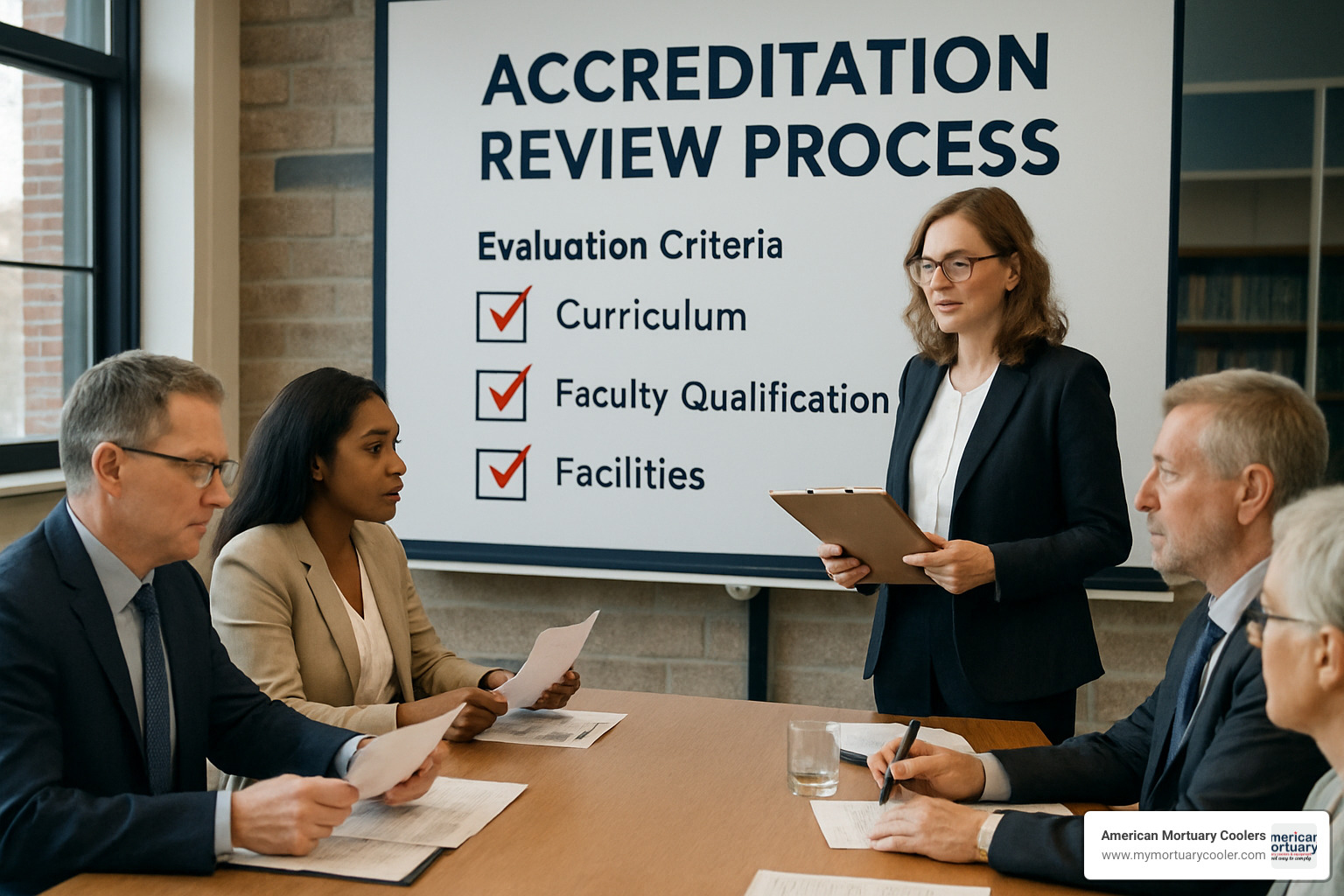
ABFSE Accreditation Is Non-Negotiable
I've spoken with countless funeral professionals across Tennessee and beyond, and they all stress the same point: never compromise on accreditation. When searching for a mortuary science program near me, ABFSE accreditation matters for several practical reasons:
First, most state licensing boards simply won't let you sit for the National Board Examination without an ABFSE-accredited degree. It's like trying to drive without a license—you can't even get started.
Beyond licensure eligibility, accreditation ensures quality standards are met. Think of it as the difference between a handshake agreement and a written contract—one has verification built in. Accredited programs must maintain specific standards for their curriculum, faculty qualifications, facilities, and student outcomes.
There's also the financial aspect. Students at accredited programs can access federal financial aid, which can be a game-changer for many aspiring funeral professionals. Plus, if you ever decide to transfer or pursue further education, credits from accredited programs are much more likely to be recognized elsewhere.
One detail worth noting: the ABFSE specifically identifies programs where more than 50% of coursework can be completed online. This transparency helps you understand exactly what kind of learning experience you're signing up for—whether mostly hands-on or partially remote.
The ABFSE Directory of Programs is your best friend during this research phase. It lists all accredited programs with their contact information, location, and current accreditation status—an invaluable resource when you're making this important decision.
Compare Graduation, Exam & Placement Data
Numbers tell stories, and in mortuary science education, three sets of numbers matter most: graduation rates, National Board Examination pass rates, and job placement rates. The ABFSE requires all accredited programs to publicly share this data, giving you a window into how effective each program truly is.
The differences between programs can be striking. Let me share some real examples:
Kansas City Kansas Community College's Mortuary Science program boasted a 95% graduation rate in 2022, with every single graduate finding employment in funeral service. That's an impressive track record! Meanwhile, Worsham College of Mortuary Science reports that 92% of their graduates secure jobs in the field.
Ivy Tech Community College's program shows similar graduation success with a 99% graduation rate in 2023, though their employment statistics reveal an interesting nuance—while 95% of graduates found employment, only 68% were working specifically in funeral service.
When it comes to the all-important National Board Exam, the variations get even more interesting:
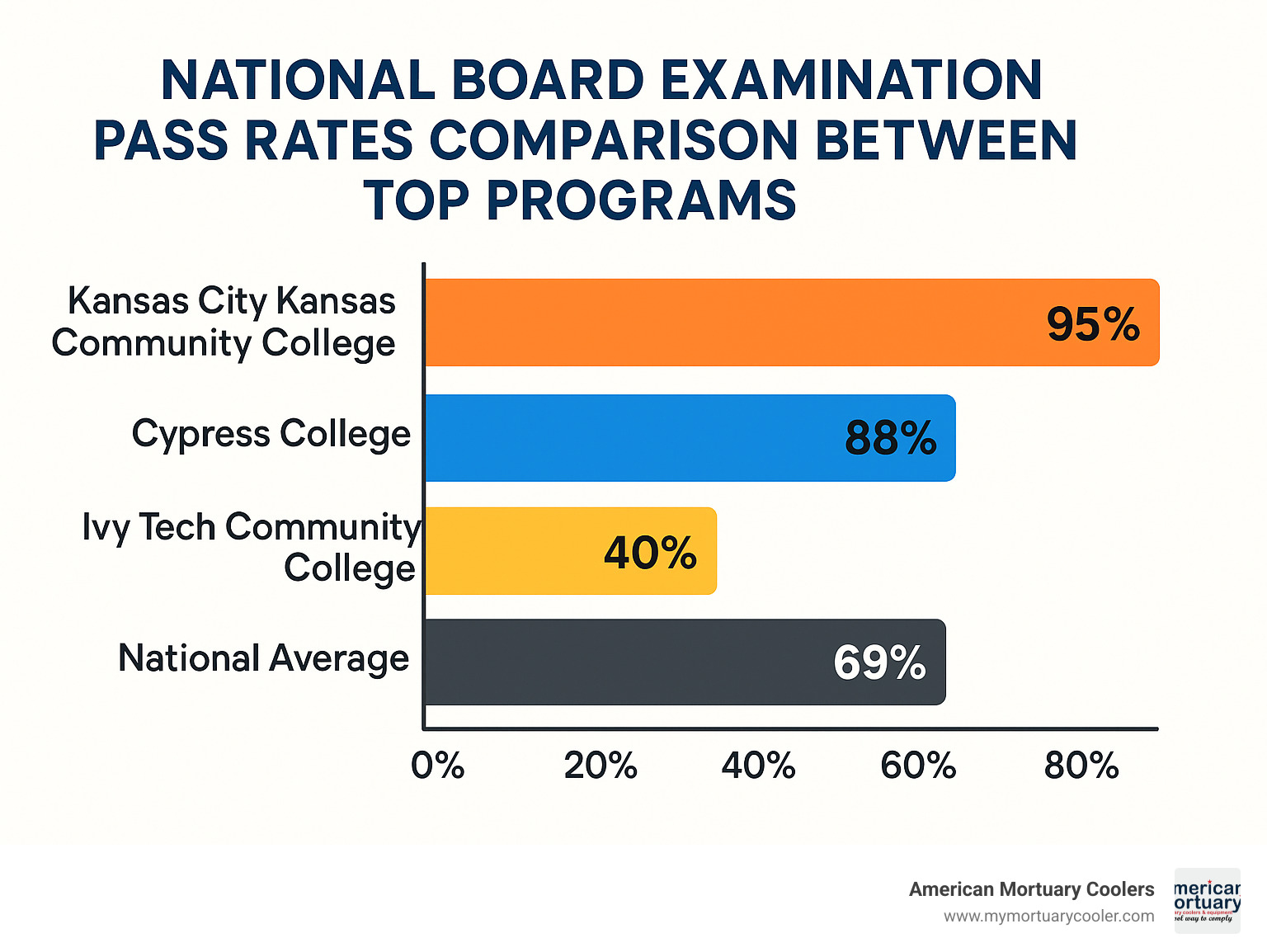
Kansas City Kansas Community College graduates achieved a 95% pass rate on the Arts section in 2022, significantly outperforming the national average of 69%. Cypress College also showed strong results with 2023 pass rates of 88% for Arts and 91% for Sciences, compared to national averages of 78% and 69% respectively.
Not all programs perform above the national average, though. Ivy Tech's 2023 results showed pass rates of 40% for Arts and 53% for Sciences—well below the national benchmarks. This kind of variation highlights why researching outcomes is so crucial when choosing a mortuary science program near me.
In our work at American Mortuary Coolers, we've noticed that graduates from high-performing programs tend to advance more quickly in their careers. They often move into management positions where they're making equipment decisions for their facilities—including choosing quality mortuary coolers that will serve their businesses for years to come.
These statistics aren't just numbers—they're predictors of your future success. A program with consistently strong outcomes in graduation, exam passing, and job placement demonstrates that it's effectively preparing students for rewarding careers in funeral service.
Way 3: Compare Curriculum & Hands-On Training in Each Mortuary Science Program Near Me
Looking for the perfect mortuary science program near me means going beyond just the classroom teachings. The hands-on training you'll receive makes all the difference in preparing you for real-world funeral service work. After all, this profession blends technical skills with compassionate care – something you can't learn from textbooks alone.
The quality of practical training varies dramatically between schools. Some programs offer state-of-the-art facilities right on campus, while others partner with local funeral homes to provide real-world experience. The best option? Programs that offer both.
Take San Antonio College's Mortuary Science program, for example. They feature an on-campus embalming facility and are developing their own mortuary that will serve actual families while training students. This creates an invaluable bridge between classroom theory and professional practice.
Cypress College takes a different approach, emphasizing artistic development through "hands-on restorative art via clay model work." These practical sessions help students develop the delicate reconstruction skills families will depend on during their most difficult moments.
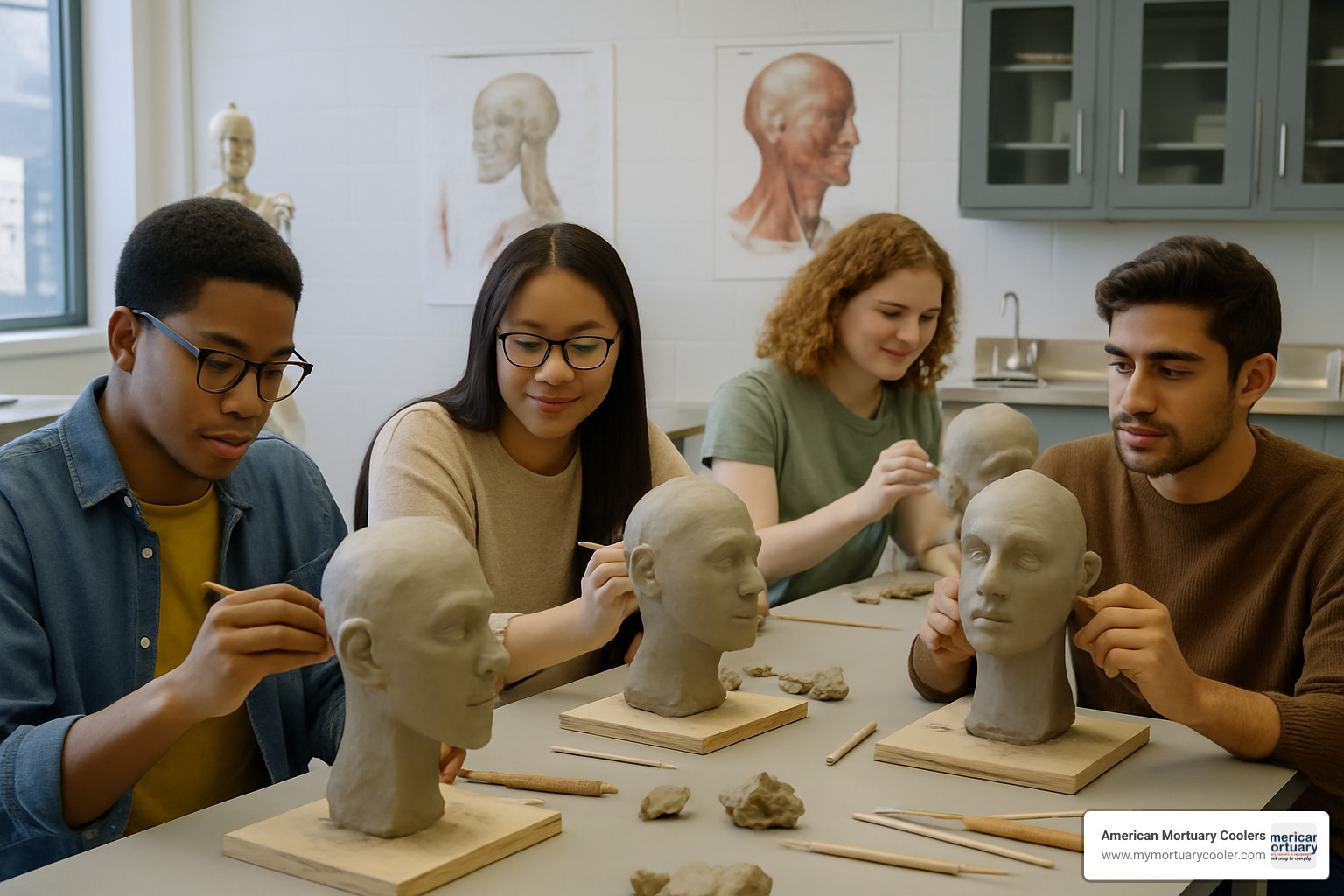
On-Campus Labs vs. Approved Funeral-Home Sites
When researching a mortuary science program near me, pay close attention to where your practical training will take place. Both settings offer distinct advantages.
On-campus laboratories provide controlled environments where you can learn without the pressure of serving grieving families. These specialized spaces come equipped with industry-standard tools and allow for immediate faculty feedback. You'll appreciate having the chance to practice embalming techniques or restorative art skills repeatedly before working with actual cases.
Meanwhile, approved funeral home sites offer something equally valuable – authentic workplace experience. Here, you'll encounter diverse cases, build professional connections, and see different approaches to funeral service. Many students find their first job through these clinical affiliations, making these partnerships incredibly valuable.
As one program director wisely noted, "A career working in a funeral home or crematory can be very rewarding; however, it requires a unique combination of interpersonal skills, intellect, and business acumen." This perfectly captures why hands-on training in real environments matters so much.
Practicum Hours & Case Requirements
When comparing a mortuary science program near me, don't just ask about the number of credit hours – dig deeper into the practicum requirements. This is where programs truly differentiate themselves.
First, ask about minimum case requirements. How many embalming cases will you need to complete before graduation? Quality programs typically require students to participate in 10+ embalming cases and assist with multiple funeral arrangements and services.
The qualifications of your supervisors matter tremendously. Will you be learning from experienced, licensed funeral directors with years of practical knowledge, or relatively new professionals? The depth of their experience directly impacts yours.
Also consider the evaluation methods used during your practicum. The best programs have structured feedback systems that help identify your strengths and areas for improvement. Regular evaluations ensure you're progressing appropriately and developing the confidence needed for this sensitive profession.
The variety of experiences offered is another critical factor. Will you be exposed to different cultural traditions, religious practices, and service types? Diversity of experience prepares you for the wide range of families you'll serve throughout your career.
Finally, check the scheduling flexibility of practicum experiences. If you're a working student or have family obligations, programs offering evening or weekend practicum hours might be essential for your success.
At American Mortuary Coolers, we've partnered with several mortuary science programs nationwide to provide equipment demonstrations. These partnerships give students hands-on experience with the specialized refrigeration units they'll use throughout their careers. We've consistently observed that graduates with extensive practical training adapt more quickly to workplace demands and advance more rapidly in their careers.
Way 4: Balance Time, Cost & Distance—Including an Online Mortuary Science Program Near Me
Let's talk about the practical side of your funeral service education journey—because your wallet and your schedule matter just as much as the quality of education you'll receive. When you're searching for a mortuary science program near me, you'll need to weigh several real-world factors that impact your daily life.
The price tag of your education can vary dramatically depending on where you enroll. Public community colleges typically offer the most budget-friendly options, especially if you qualify for in-district or in-state tuition rates. For example, programs at places like Miami Dade College or Cypress College might save you thousands compared to private institutions—though private schools like Worsham College might offer specialized facilities or scheduling that better fits your needs.
Here's a practical look at what you might expect to pay at different institutions:
| School | In-State Tuition | Out-of-State Tuition | Program Length |
|---|---|---|---|
| Arapahoe Community College (CO) | $10,800 (approx.) | $38,700 (approx.) | 5 semesters |
| Cypress College (CA) | $4,600 (approx.) | $15,900 (approx.) | 4 semesters |
| Carl Sandburg College (IL) | $11,500 (approx.) | $16,800 (approx.) | 4 semesters |
Beyond tuition, remember to factor in the full financial picture: textbooks (which can be surprisingly expensive for specialized subjects), lab supplies, living expenses while you study, and potential income you might miss out on during full-time education. Don't forget about those post-graduation expenses too—licensing exam fees and initial licensure costs add up quickly.
Time commitment varies significantly as well. Most associate degrees require about 66 credit hours and typically take 2-3 years when you include prerequisites. If you're eyeing a bachelor's degree, you're looking at roughly 120 credit hours over four years. Some programs do offer accelerated options if you're willing to study year-round without breaks—something to consider if you're eager to enter the workforce quickly.
Online Mortuary Science Program Near Me: Pros & Cons
The digital revolution has reached mortuary science education, with 43 accredited programs now offering some level of online coursework. This can be a game-changer if you're balancing other responsibilities or don't live near a physical campus.
Online programs offer wonderful flexibility—you can often complete theoretical coursework around your existing job or family commitments. This might mean studying early mornings before your shift starts or late evenings after the kids are in bed. You can potentially stay put in your current location, saving on relocation costs and maintaining your support network.
One of our customers who completed a hybrid program shared: "Being able to stay at my apprenticeship job while completing most coursework online meant I graduated with two years of experience already under my belt—and no student housing debt!"
But online learning isn't all convenience and savings. Every accredited mortuary science program requires hands-on components—there's simply no way to learn embalming or restorative art solely through a computer screen. You'll need to plan for mandatory on-campus laboratory sessions, which might mean intensive weekend or week-long visits to campus several times during your program.
Other potential drawbacks include state authorization issues (not every online program can legally enroll students from every state), fewer networking opportunities with classmates and instructors, and the need for reliable technology and internet access. Online learning also demands serious self-discipline—there's no professor physically present to notice if you're falling behind.
Before you commit to an online program, verify four critical things:
- Is the institution authorized to offer courses in your state?
- Will the program satisfy licensing requirements where you plan to practice?
- Can you make the required on-campus sessions work with your schedule?
- Do you have the technology and self-discipline needed for online success?
At American Mortuary Coolers, we've noticed more and more students choosing a hybrid approach—completing theory work online while blocking out concentrated periods for hands-on training. This balanced approach gives you flexibility without sacrificing the practical skills that funeral homes actually care about when hiring.
If you're interested in exploring online options further, we've compiled a detailed guide to affordable online funeral director programs that digs deeper into what to expect.
Way 5: Evaluate Culture, Support & Networking
When searching for a mortuary science program near me, don't overlook the human element. The community you'll join can be just as important as the curriculum you'll study. A program's culture, support systems, and professional connections often make the difference between simply graduating and launching a thriving career.
Class size matters more than you might think. In smaller cohorts, you're not just a face in the crowd—you're part of a close-knit community. Take Worsham College of Mortuary Science, for example, where 25 instructors serve about 180 students. This favorable ratio means more one-on-one attention and opportunities to build meaningful relationships with the people who'll be writing your recommendation letters.
The faculty teaching you should be more than just academics—they should be practitioners with real-world experience. As Holly Herrera from Cypress College beautifully put it: "Each faculty member of the mortuary program has positively contributed to my time here." When instructors maintain active connections to funeral homes and industry organizations, they bring fresh insights to the classroom and often help students land their first jobs.
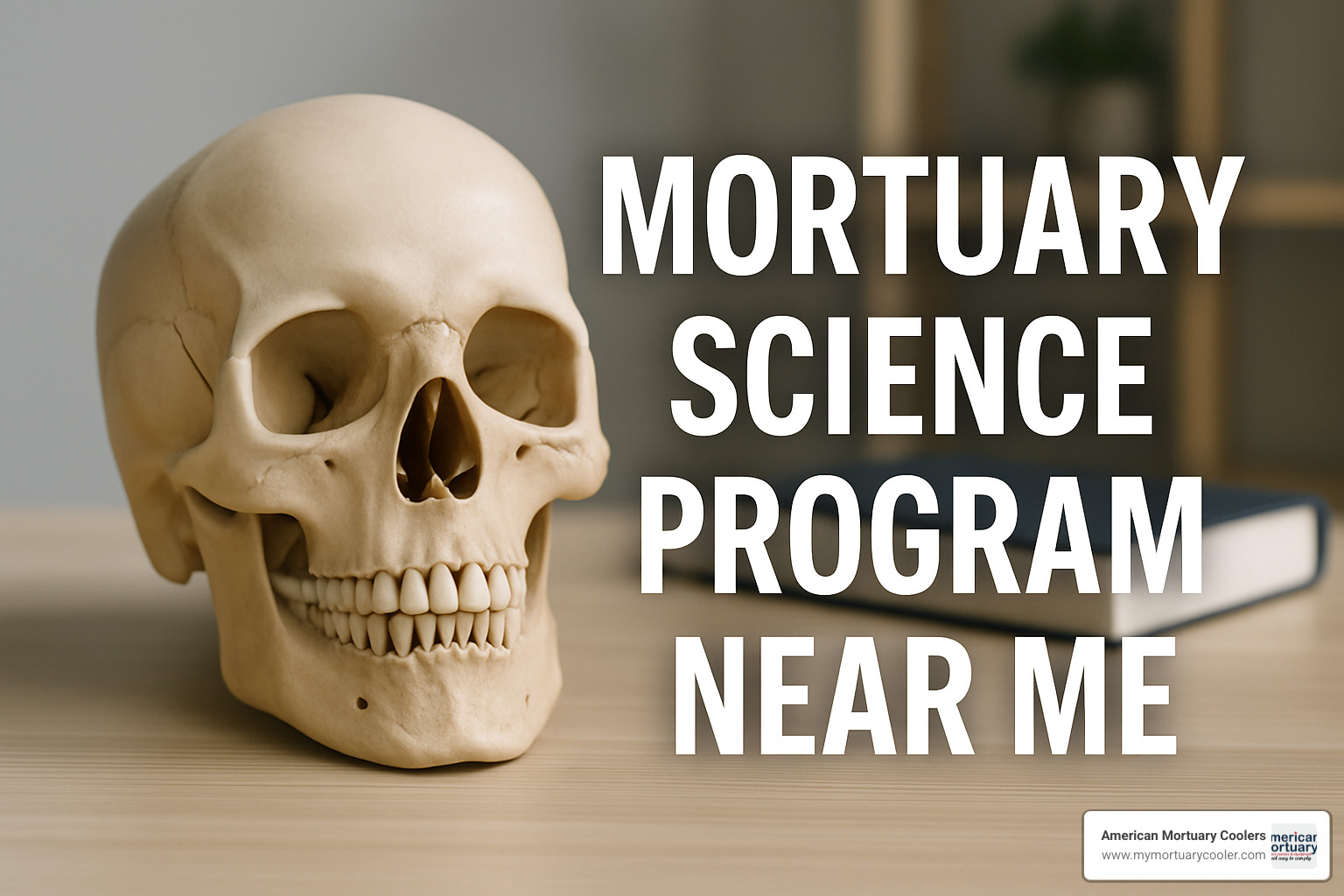
Alumni Placement, Mentorship & Continuing Education
A mortuary science program near me with a strong alumni network offers advantages that extend far beyond graduation day. When evaluating programs, ask whether graduates stay connected through mentorship programs, guest speaking opportunities, or professional events. These relationships often translate into job offers and career guidance when you need it most.
Look for programs with established internship pipelines to funeral homes and mortuaries in your region. These connections can smooth your transition from student to professional. Arapahoe Community College exemplifies this approach, proudly highlighting student achievements like earning prestigious scholarships and featuring alumni accomplishments in their communications.
The best programs don't just prepare you for your first job—they support your entire career. Ask whether they offer continuing education opportunities to help maintain your license and develop specialized skills. Whether you're interested in advanced restorative art techniques, cremation certification, or green funeral practices, your alma mater should provide pathways for continued growth.
At American Mortuary Coolers, we've noticed that graduates from programs with robust industry connections tend to advance more quickly. They're often the ones who end up making equipment decisions for their facilities, including selecting our custom mortuary coolers built for durability and reliability.
Financial Aid, Scholarships & Academic Advising
Let's be honest—mortuary science education is an investment in your future, but the costs can add up quickly. The right mortuary science program near me should offer comprehensive financial support, including access to federal aid, program-specific scholarships, and clear guidance through the funding process.
Beyond financial considerations, the quality of academic advising can make or break your educational experience. Seek out programs with dedicated advisors who understand the unique requirements of mortuary science education and can help you steer prerequisites, internships, and licensing requirements.
Everyone struggles with challenging courses at some point. Programs that offer tutoring services, study groups, and academic support resources demonstrate their commitment to your success. These safety nets can be particularly important for courses like embalming chemistry or pathology.
Don't underestimate the value of student organizations either. Mortuary science student associations provide opportunities to learn outside the classroom, build friendships with future colleagues, and develop leadership skills that will serve you throughout your career.
We at American Mortuary Coolers serve funeral professionals across the country—from Tennessee to the Midwest, Northeast, Southeast, Southwest, and Pacific regions. Our experience working with mortuary science graduates has shown us that those who emerge from supportive, well-connected programs tend to thrive in the profession. They bring not just technical skills but also the professional network and confidence needed to make an immediate impact in funeral service.
Frequently Asked Questions about Picking a Mortuary Science School
How long does a typical program take?
Wondering about the time commitment for a mortuary science program near me? The journey to becoming a funeral service professional varies depending on which educational path you choose:
Most students complete an Associate in Applied Science (AAS) degree, which typically takes about 18-24 months of dedicated coursework after prerequisites. These programs usually require between 60-70 credit hours total. At Kansas City Kansas Community College, for example, students need to complete 66 credit hours to graduate.
If you're looking for more advanced education, bachelor's degree programs in mortuary science take about 4 years to complete. These programs dive deeper into both general education and specialized funeral service topics, requiring approximately 120 credit hours.
Don't forget about the internship or apprenticeship phase! After your classroom education, most states require a hands-on learning period lasting 1-2 years under the supervision of a licensed funeral director. This practical experience is where theory meets reality, and you'll apply everything you've learned in real funeral service settings.
As one program advisor wisely recommends: "Enroll full time (at least 12 units per semester) to complete the associate program in three semesters after prerequisites." Your course load directly impacts how quickly you can enter the profession, so planning your academic schedule thoughtfully can save you valuable time.
Are there fully online mortuary science degrees?
When searching for a mortuary science program near me with online options, here's the reality: there are no 100% online ABFSE-accredited mortuary science programs currently available. The hands-on nature of funeral service simply requires some in-person training.
That said, hybrid programs have become increasingly popular and accessible. Of the 58 accredited programs nationwide, 43 now offer some form of distance education. These range from a few online classes to programs where you can complete more than half your coursework virtually.
The ABFSE specifically identifies programs where students can complete over 50% of coursework online, making it easier to find flexible options. But remember – even the most online-friendly programs require on-campus sessions for laboratory courses in embalming and restorative art. There's simply no substitute for hands-on learning when it comes to these technical skills.
Before enrolling in any distance education program, take time to verify two critical factors: first, that the institution is authorized to offer courses in your state of residence (through NC-SARA or other agreements), and second, that the program meets the licensing requirements for the state where you plan to practice.
As one program director explains it: "Distance Education courses are designed to enable completion of coursework at a time and place independent of the course professor, typically via the internet." This flexibility can be a game-changer if you're balancing work, family, and education – just be prepared for those essential campus visits.
What jobs can I get after graduation?
After completing a mortuary science program near me, your career options extend beyond what many people realize. The funeral service profession offers diverse paths based on your interests and strengths:
Becoming a funeral director might be your calling if you excel at guiding families through difficult times while managing the logistics of meaningful services. If you're more technically and scientifically inclined, working as an embalmer allows you to focus on preparation and preservation of the deceased.
Many graduates find fulfillment as crematory operators, especially as cremation rates continue to rise across the country. Others find their talent lies in pre-need counseling, helping families make thoughtful arrangements before the time of need.
For those with business acumen, career advancement often leads to roles as funeral home managers or even owners. Some graduates with a passion for helping others through grief become specialized bereavement counselors, while those who prefer behind-the-scenes logistics might work as mortuary transport specialists.
The employment outlook is bright – the Bureau of Labor Statistics projects a healthy 9% job growth for funeral service workers between 2021 and 2031, adding about 7,900 new positions annually. This growth rate outpaces the average for all occupations.
When it comes to earnings, salaries vary widely based on location, role, and experience. Industry data shows embalmer/funeral director salaries ranging from $26,000 for entry-level positions to $126,000 for experienced professionals, with the average around $53,000. Many funeral professionals find the combination of stable employment, meaningful work, and the ability to truly help communities makes this career path especially rewarding.
At American Mortuary Coolers, we're proud to support funeral service professionals at every stage of their careers with durable, custom-built equipment designed specifically for the unique needs of the profession you're training to enter.
Conclusion
Finding the right mortuary science program near me is truly a pivotal decision that will shape your entire career in funeral service. Throughout this guide, we've explored five essential strategies to help you make this important choice with confidence. By clarifying your career goals, verifying program accreditation, comparing hands-on training opportunities, weighing financial considerations, and evaluating program culture, you're now equipped to make a decision that aligns with your professional aspirations.
The funeral service profession represents a unique blend of scientific precision and compassionate artistry. When you're supporting families during life's most difficult moments, both technical skills and emotional intelligence matter tremendously. The program you select should nurture both these aspects of your professional development.
Here at American Mortuary Coolers, we take genuine pride in supporting the education of future funeral service professionals. Our journey with mortuary science programs across the country has shown us how quality education translates to quality service. The custom mortuary coolers we design are built with insights from experienced funeral directors who understand the day-to-day realities of the profession.
From our home base in Tennessee, we deliver our durable, custom-built cooling solutions directly to funeral homes throughout the contiguous 48 states. Whether you end up working in the Midwest, Northeast, Southeast, Southwest, or Pacific regions, our team is committed to supporting your professional journey with equipment you can count on.
As you begin your educational path, I'd encourage you to visit several programs in person if possible. There's simply no substitute for experiencing the campus environment firsthand, meeting the faculty who will guide your learning, and speaking with current students about their experiences. These conversations often reveal insights that websites and brochures simply can't convey.
Your decision to enter this profession speaks volumes about your character and your desire to make a meaningful difference in people's lives. At American Mortuary Coolers, we share that same commitment to excellence and service. We look forward to being part of your professional journey, providing the reliable equipment you'll need as you build your career in this vital and rewarding field.
The time you invest now in finding the right educational fit will pay dividends throughout your entire career in funeral service. Choose wisely, and know that we're here to support you every step of the way.

















